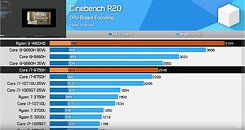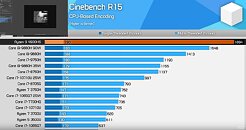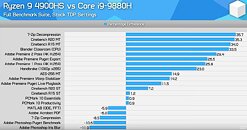Monday, March 30th 2020

AMD Ryzen 9 4900HS Torpedoes Intel's Core i9 Mobile Lineup, Fastest Mobile Processor
Reviews of AMD's flagship mobile processor, the Ryzen 9 4900HS went live today, and the verdict is clear. Intel has lost both performance and battery-efficiency leadership over its most lucrative computing segment: mobile client computing. In a Hardware Unboxed review comparing the 4900H to Intel's current Core i9 flagship, the i9-9880H, the AMD chip at its stock 45 W TDP beats the Intel one even with the Intel chip configured to 90 W cTDP.
The 4900HS posts 11.9% higher CineBench R20 score (both chips are 8-core/16-thread) when the Intel chip is bolstered with 90 W cTDP, and a whopping 33% faster when the i9-9980H is at its stock settings, and 54% faster when its capped at 35 W cTDP. It also ends up over 150% faster than AMD's last fastest mobile processor, the 12 nm "Picasso" based Ryzen 7 3750H. The story repeats with CineBench R15 (4900H being 34% faster than stock i9-9880H), 18% faster at Handbrake HEVC, 25% faster at Blender "Classroom," and 35% faster at 7-Zip benchmark. The AMD chip lags behind by 12% in the less-parallelized Photoshop. On creativity apps that do scale with cores, such as Premiere "Warp Stabilizer 4K," the 4900HS is 12.6% faster. Gaming performance remains an even split between the two chips. Find several more interesting test results and commentary in the Hardware Unboxed presentation here. Intel has already announced a response to the 4900HS in the form of the i9-10980HK.
The 4900HS posts 11.9% higher CineBench R20 score (both chips are 8-core/16-thread) when the Intel chip is bolstered with 90 W cTDP, and a whopping 33% faster when the i9-9980H is at its stock settings, and 54% faster when its capped at 35 W cTDP. It also ends up over 150% faster than AMD's last fastest mobile processor, the 12 nm "Picasso" based Ryzen 7 3750H. The story repeats with CineBench R15 (4900H being 34% faster than stock i9-9880H), 18% faster at Handbrake HEVC, 25% faster at Blender "Classroom," and 35% faster at 7-Zip benchmark. The AMD chip lags behind by 12% in the less-parallelized Photoshop. On creativity apps that do scale with cores, such as Premiere "Warp Stabilizer 4K," the 4900HS is 12.6% faster. Gaming performance remains an even split between the two chips. Find several more interesting test results and commentary in the Hardware Unboxed presentation here. Intel has already announced a response to the 4900HS in the form of the i9-10980HK.




211 Comments on AMD Ryzen 9 4900HS Torpedoes Intel's Core i9 Mobile Lineup, Fastest Mobile Processor
5500M was released about 2 months ago:
www.msi.com/Laptop/Alpha-15-A3DX
Reviewers ranked it as "between 1650Ti and 1660TI Q"
I was looking at battery life and clocks and I don't think all of that is exclusively because of 7nm. Caches use a lot of power in processors, this 4900HS is monolithic so it doesn't have the same problem as the chiplet desktop chips therefore they were able to cut the cache in half, maintain performance and improve power efficiency considerably.
Zen w/ 8 MB L3 => ~44 mm2
Zen2 w/ 16 MB L3 => ~31 mm2
Basically placing a single Zen2 CCX around the die area of a single PD module+L2, PD+2 MB(~30.9).
Removing 12 MB from the CCX makes each CCX well within XV+1 MB(~14.48+5) to XV+2 MB(~14.48+10, if it existed). (Zen2 CCX with only 4 MB L3 is potentially less than 22 mm2)
www.google.com/search?q=zen+2+review&oq=zen+2+review&aqs=chrome..69i57j0l3.2618j0j7&client=ms-android-verizon&sourceid=chrome-mobile&ie=UTF-8
No, the vast majority (like 70% or more) is in the $500-1000 thin-and-light market where the 4000U series are about a year and a half overdue already.
We don't want 16 core laptops anywhere near as much as we want 4-core laptops that can have a non-terrible GPU and can actually use that GPU for more than a couple of hours away from a wall socket.
Sincerely, the 70% of laptop buyers complaining about Intel IGPs.
Edit:
Added the image reference to quote.
I see no reason whatsoever to expect Ryzen Mobile 4000U chips to not kick butt in games. The IGPUs are clocked significantly higher than before and have 2x the memory bandwidth accessible compared to previous DDR4-equipped alternatives. Obviously that's going to be a big improvement, regardless of having a few CUs less. And unless the game runs eight or lore very heavy threads (which no games do) the CPU is not going to starve the GPU for power even within the 15W TDP.I originally was (these APUs look amazing), but the Asus G14 really got me going in terms of its astounding combination of size, weight and performance. I still might not get one (it is definitely on the expensive side and I won't be buying anything in the near future anyhow), and if not I'll likely be getting some sort of 13-14" U-series equipped 25W ultralight instead. Preferably with a 16:10 or 3:2 screen and a good keyboard. Fingers crossed for something like that showing up.